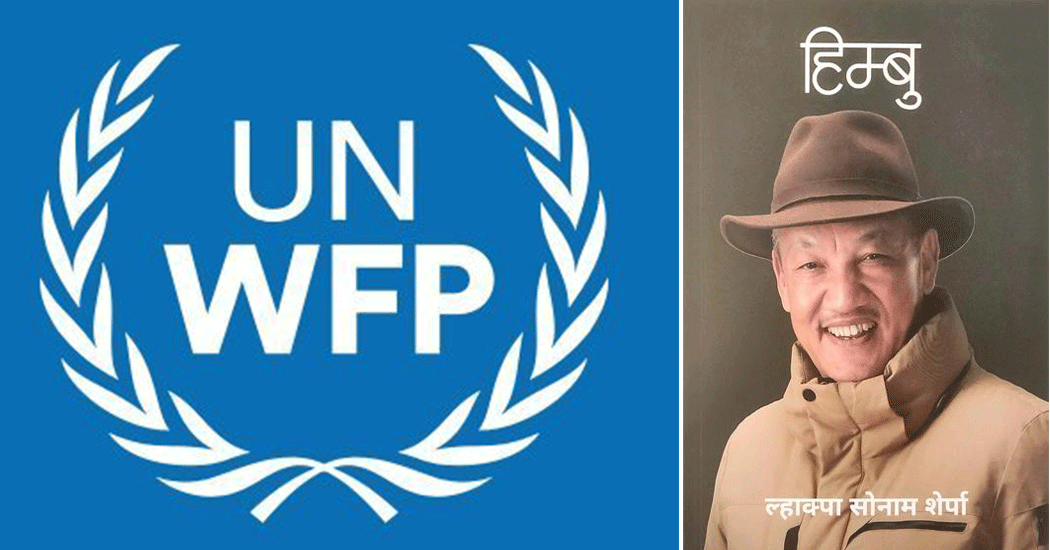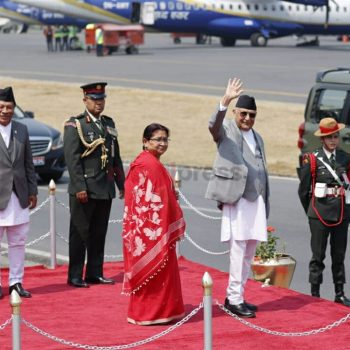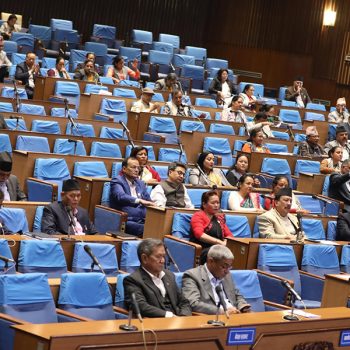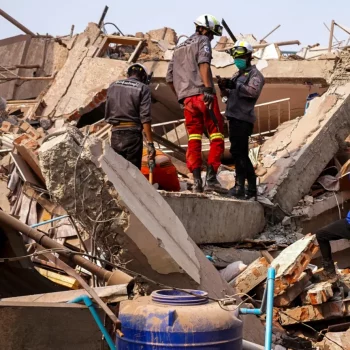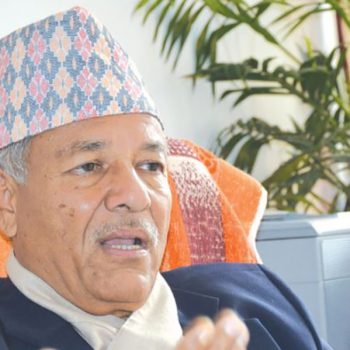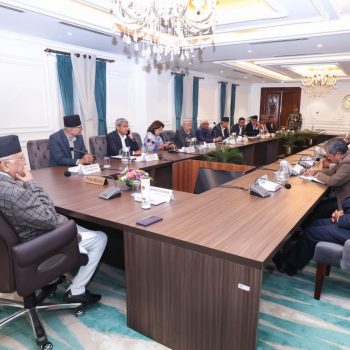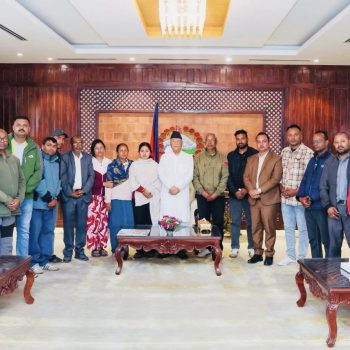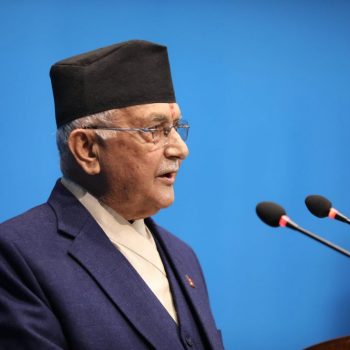MCC is successful in 80% countries, Sri Lanka’s case is different: CEO of MCA Nepal
KATHMANDU: The Millennium Challenge Corporation (MCC) has been in the news for some time. Political parties are still debating whether to pass the US government’s economic plan through parliament. Some have argued that the MCC is in the national interest and that it should be passed anyway, while others have called it a ‘treasonous project’.
In an all-party meeting held on Saturday, Prime Minister KP Sharma Oli objected that the MCC could not move forward in parliament due to Speaker Agni Prasad Sapkota. In the meeting, the main opposition party Nepali Congress said that the MCC should not be delayed. In the meantime, a conversation was held with Khadga Bahadur Bista, Chief Executive Officer of MCA Nepal, about the work of the Development Committee (MCA Nepal) under the Ministry of Finance, which has been given full responsibility for the operation of the MCC project.
The MCC, which was targeted to be passed by parliament last year, is still embroiled in controversy. How exactly is the work going now?
There is a single model for starting and implementing MCC projects around the world. Preparatory work has to be completed before the project starts. For which, first of all, the project has to be approved by the parliament. After that, the work has to be completed within five years from the date of implementation of the project. We set a date last year but could not get approval from parliament due to political controversy. However, we have already completed most of the preconditions.
What are preconditions? What activities fall under this?
Along with the land acquisition, the works for the construction of 315 km transmission line are demarcation, tower design, construction of tender documents, environmental impact assessment, etc., which we have been doing. Some work was affected by COVID. Some consultants have left. The COVID terror is on the rise again. There is a risk that this will also affect the ongoing work.
What are the projects under MCC?
MCC includes two projects including power transmission and road construction. The project includes construction of a 315 km long transmission line from Lapsiphedi in Kathmandu to Galchhi in Dhading and from Damauli in Tanahun to Sunawal via Butwal. Similarly, necessary structures should be constructed to connect the transmission lines to three major substations. It is also connected to two other substations that have already been constructed.
The Nepal Electricity Authority (NEA) also has the necessary technical assistance for capacity building and a project to assist the Electricity Regulatory Commission, which we call ETP. Similarly, 100 kilometers of roads are being rebuilt in a different way.
How will there be foreign assistance and Nepali investment in this project?
The project will bring in USD 500 million. Nepal will add USD 130 million for the implementation and operation of this project, which totals to USD 630 million or NRs. 75 billion.
There is a lot of confusion and controversy about MCC. Is this a part of the Indo-Pacific strategy?
The United States has changed its policy since the 2001 terrorist attacks. This program is part of a US policy to help countries with weak economies, with the conclusion that global terrorism is on the rise due to poverty.
The concept of MCC has been introduced with the belief that the country concerned can invest in a project of its choice, set a date for completion of the project and alleviate poverty through economic development. So this is a civilian and purely economic aid.
Since the concept of Indo-Pacific Strategy (IPS) started much later, the MCC project has nothing to do with IPS. The US Ambassador told various media outlets that the MCC was being implemented in countries outside the Indian Pacific Ocean and that the concept of IPS was generated far behind that of the MCC.
Since 2011, the project has come to this point after all political parties of Nepal came to consensus and pushed the MCC project forward after coming into power. The Government of Nepal has the right to cancel the project by issuing a 30-day notice if it thinks it is not in national interest.
How true is it that US troops will come to Nepal?
There is no truth in this. The MCC Compact’s ‘Agreement Document’ clearly states that it is not for military purposes. The law related to MCC of the US has also stated that the project will not be used for military purposes. There has been no military activity in the countries where MCC has been implemented. So this is a purely civilian financial aid. There is no reason to for a dispute on this.
Is it true that the MCC agreement is above the law of Nepal?
This is a well-planned propaganda to prevent the project from moving forward. The agreement stipulates that the MCC compact will be used in case of conflict with Nepal’s laws while operating the project. It is natural for people who do not have knowledge about project construction to feel that way. This is normal for experienced people like us who have run projects. Such conditions are also mentioned in other foreign projects.
The ‘Project Development Agreement’ of Upper Karnali, Arun III, Khimti Hydropower Project, Melamchi and other projects also states that the agreement will be valid even if it is in conflict with Nepal’s law.
The MCC agreement stipulates that no tax can be levied on the purchase or import of necessary materials. How will the project move forward if the government later collects customs duty, does not allow import, brings a provision not to buy the tower or imposes tax? Because of this, the MCC agreement is said to be above Nepal’s law.
But this agreement is not above the constitution of Nepal. Article 1 of the Constitution of Nepal itself has a provision that the law that is in conflict with the Constitution of Nepal is invalid to the extent of conflict.
There is also talk of US control over Nepal’s resources and intellectual property in the future. How about this?
There is no truth or basis in this matter.
There are allegations that Uranium will be found during the operation of the project and that the US will try to seize it. Is that so?
Uranium is not found that easily. No one can find and bring it. Therefore, such things are just a conspiracy to stop the MCC project.
Uranium mining requires different processes, investments, agreements with nuclear agencies, technology. What would I answer for an allegation based on whims?
It is said that the consent of the project is also required for the audit. Is this true?
This is ridiculous. The Government of Nepal can audit MCA Nepal at any time. The Office of the Auditor General has so far conducted the third audit. The report is yet to come. Under the Right to Information, a copy of the 3-year audit can be obtained through the Information Officer of MCA Nepal or through the Office of the Auditor General. Let’s see who will not give the information if someone asks!
How much has been spent for MCC so far?
We have spent about 3 billion rupees so far. Of this, Rs 1.40 billion has been spent by the Government of Nepal and Rs 1.60 billion by the MCC. About Rs 1.10 billion has been spent on land acquisition alone.
How does MCC provide the grants?
Grants of the MCC approved by the parliament come through digital payment. The money does not have to come directly to MCA Nepal’s account. Similarly, for local payments, we receive the amount allocated for the project by the Ministry of Finance through its treasury.
Some lawmakers have been saying that the MCC should be amended and then passed. What is your opinion on this?
We are positive about this. The MCC is also positive about this. MCC is confident that the project will move forward even if amendments have to be made.
Will Nepalese or foreigners get the contract for the project?
Everything is open-tender. Foreigners probably will not come and bid for small works of up to Rs. 1 Crore, so Nepalese will get this. Foreigners may be attracted to tenders worth up to Rs. 1 billion.
Bidders around the world can apply online for the contract work of the project. Even the United States, which provides grants, cannot prioritize its own companies.
In many countries, MCC has failed. Sri Lanka rejected it. What is the guarantee of success in Nepal?
MCC has been successful in more than 80 percent of the countries. It has failed only in very few countries. Only people with a negative mindset say that MCC has failed in too many countries.
Sri Lanka is different. There was no signing of the compact. The MCC board meeting decided not to implement the project in Sri Lanka due to delay in moving the project forward. The cases of Nepal and Sri Lanka are very different.





